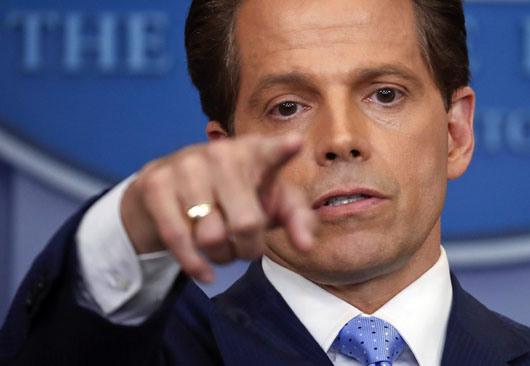by WorldTribune Staff, August 2, 2017
While an obscenity-laced interview with the New Yorker was given as the reason for the firing of Anthony Scaramucci, it was his dealings with a Chinese conglomerate that is intent on gobbling up American strategic assets that likely brought down the White House communications director, reports say.
A “red flag” went up in Washington when Scaramucci’s hedge fund, SkyBridge Capital, was sold to HNA Capital, a subsidiary of Chinese conglomerate HNA Group, Jim Rickards, editor of investment newsletter Strategic Intelligence, told CNBC.

The deal, finalized in January and reportedly valuing SkyBridge at around $200 million, is currently pending approval from the Committee on Foreign Investment in the United States (CFIUS) which reviews foreign purchases of American companies for national security risks.
“In some ways, the White House is probably relieved to get rid of Scaramucci because now, no matter what happens to that deal, that burden won’t be with the White House,” Rickards said. “Using the [New Yorker] interview was great cover to get rid of Scaramucci before the hedge fund deal and national security review blew up in his face.”
“Guo Wengui has on record revealed that HNA is a Chinese infiltration scheme operated by the Chinese intelligence organizations directly reporting to Wang Qishan, financed by state owned banks, with the singular objective of buying American strategic assets, senior government officials and politicians,” according to Hoover Fellow and Geostrategy-Direct.com contributing editor Maochun Yu. “It would not be surprising that CFIUS did Mooch in. But then, Mooch really has no one else but himself to blame.”
Regulators have had their eyes on HNA, which owns Chinese carrier Hainan Airlines, since it went on a $50 billion global spending spree starting in 2015, according to Dealogic.
HNA’s $416 million investment into Global Eagle Entertainment was blocked last week amid concerns over customer data exchanged on the U.S. firm’s WiFi, Reuters reported.
The firm had previously received the green light for various U.S. transactions, including a 25 percent stake in Hilton and the acquisition of Ingram Micro.
The potential rejection of the SkyBridge-HNA deal was a concern for newly-appointed White House Chief of Staff John F. Kelly, Todd Eberly, associate professor of political science and public policy at St. Mary’s College of Maryland, told CNBC.
“Kelly is trying to create a new narrative of a White House that is more focused and on message – a White House where the staff are no longer major news stories,” Eberly said.
Eberly said CFIUS refusal of the SkyBridge-HNA deal would have been “a major embarrassment” for the White House.
Subscribe to Geostrategy-Direct __________ Support Free Press Foundation
